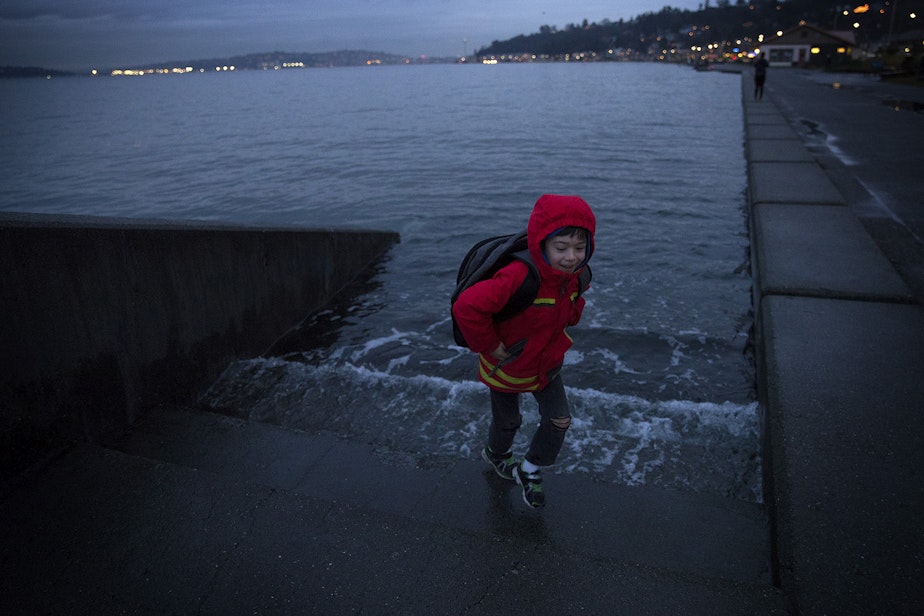Federal climate report predicts huge economic toll on Pacific Northwest

Kim Malcolm talks with KUOW environment reporter John Ryan about the economic toll of climate change in the Pacific Northwest.
A federal report released on Friday looks at how climate change will impact the U.S. economy. It predicts major impacts to Northwest fisheries and the agricultural sector. It also predicts increases in wildfires, floods and landslides across the Northwest.
Interview highlights have been lightly edited for clarity
Malcolm: What does the report say about how climate change will affect Washington state fisheries?
Ryan: Most of the heat that we humans and our pollution have added to the atmosphere has gone into oceans and we are expecting lots of impacts there.
Here, salmon is a big deal, of course, and we’re expecting actually in the streams that they spawn in, we’re going to see less snow pack, warmer waters, lower flows in the summer. So, fewer salmon streams. The report says we could lose about a fifth of all salmon streams in this century. They say it could cost $3 billion in economic losses due to losses for salmon fishing.
Other losses in the oceans as well — if you remember the blob — that came along with big algae blooms, ones that make toxic stuff. Algae blooms make it difficult or unhealthy to swim, or even to eat shellfish… and we could see a lot more of that in Puget Sound.
Read more: 'The blob' blamed for bringing invasive crab to Puget Sound
The report said we could see 30 more days per year that are favorable to these algae blooms.
We grow and export a lot of crops from Washington state. What did the report have to say about climate change and agriculture?
It says that things will have some big negative impacts to agriculture, but also that these things have already started happening — that climate change is here.
The report looked at the year of 2015 when we had a really dry summer, a really dry winter, bad forest fires, lots of warm temperatures, as a model. That year for agriculture, Washington farmers lost about $7 million. So that’s something that we should expect a lot more of in the years ahead.
This report is also laying out how some people and some places are going to be affected a lot more than others. Can you explain that?
In the Northwest, we have a temperate climate. That’s not going to change entirely. Our changes will be somewhat more moderate than other parts of the world, but that doesn’t mean we won’t be affected.
For one thing, we trade with all these other parts of the world that could really see calamitous changes coming down the pike for them, and some people here are going to be much more affected than others. Farm workers, for example, who have to work no matter what the conditions — whether it’s heat extremes or forest fire smoke — these sorts of things can be very serious for human health. Tribes: These are the ‘frontline communities’ as the report calls them.
I spoke earlier this month to a guy named Tyson Johnston, he’s the vice president of the Quinault Indian Nation on the Washington coast. They’re one of the tribes that’s actually having to relocate some of their reservation because of the risk of tsunamis and the problem of rising seas.
Johnston told me: 'Our way of life, our treaty rights, our natural resources are at risk and we all need to pay attention to that and make meaningful policy change to address.’
The chapter of the federal report on climate change in the Northwest focused more on what the impacts are going to be and less on what we can do about it. But it had a bit on that, too, and one of the short answers is that we can adapt to some of these changes — maybe not all of them — but the longer we wait to reduce and quit using fossil fuels, the worse the changes will be and the harder it will be to adapt.
We might see more and more of the options being to just abandon this village, or sewage plant, or an irrigation system because it’s not worth trying to adapt to it. The change is too great.
This is a nonpartisan, federal report from the Trump Administration. It’s the work of 13 different government agencies, and yet the Trump White House is sending a different message than federal scientists on this. What do you make of that?
The Trump White House message or goal is: Let’s not worry about climate change. Instead, let’s focus on our agenda of deregulating the economy, getting government out of the way of what business wants to do.
It’s interesting to me that they didn’t try to squash the support. For one thing, it is required by law. They would have had to maybe break the law or change the law to try and get around it. And they didn’t try to somehow tinker with it or tamper with the information, which the White House has down in the past. In the second Bush Administration, they doctored a climate report and they got found out, and they got all sorts of grief for it. So perhaps in this White House, the thinking might be more that we can just ignore this; we can let it go out there, and we can just keep pushing our agenda, and not worry about what this one scientific report has to say.
By the end of the century, the report says climate change could slash the economy by 10 percent. That’s a bigger drop than during the Great Recession. When asked about the report, President Trump told reporters, "I don’t believe it."






